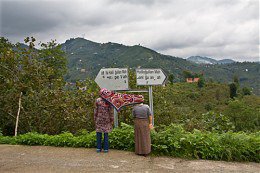Life Is Elsewhere
dal 2/6/2012 al 21/7/2012
Segnalato da
Oreet Ashery
Mariana Castillo Deball
Chan Sook Choi
Kaspars Goba
Nilbar Gures
Bodil Furu
Mathilde ter Heijne
J&K
Janne Schafer
Kristine Agergaard
Nadin Reschke
Maya Schweizer
Dorothee Bienert
2/6/2012
Life Is Elsewhere
Galerie im Kornerpark, Berlin
This group show utilises the event of this year's 275th anniversary of the founding of the Bohemian village to talk about the potential of cultural and religious diversity for the future of the immigration society.

curated by Dorothee Bienert
*Artists: *Oreet Ashery (IL/GB), Mariana Castillo Deball (MX/DE), Chan
Sook Choi (KR/DE), Kaspars Goba (LV), Nilbar Güres (TR), Bodil Furu
(NO), Mathilde ter Heijne (NL/DE), J&K (Janne Schäfer, DE; Kristine
Agergaard, DK), Nadin Reschke (DE), Maya Schweizer (FR/DE)
The exhibition utilises the event of this year's 275th anniversary of
the founding of the Bohemian village, one of the settlements of
religious refugees in Berlin, to talk about the potential of cultural
and religious diversity for the future of the immigration society. One
of the most important preconditions for the productivity of cultural
pluralism is the adherence to the human rights of freedom of religion
and conscience. The artists' installations, photos and videos explore in
very different ways issues of belief, diversity and tolerance/intolerance.
The exhibition is named after the title of a novel by Milan Kundera
which he wrote in 1969/70, after the Prague Spring and the associated
cultural freedom were ended by the invasion of Soviet troops. The hope
for a better life elsewhere is an issue of global migration, but also
the title stands for the desire of individuals for personal freedom and
fulfillment. The exhibition therefore intersect several thematic lines:
First, it's about the relationship between issues of religion and
conscience and questions of cultural identity. Works by Bodil Furu and
Maya Schweizer address the struggle of people with the question of how
to organize their lives "right" and how to participate in the
multi-cultural society. Chan Sook Choi's installation "For Gott EN"
talks about the interplay of faith, doubt and memory. Artists such as
Oreet Ashery and Nilbar Güres reflect with their interventions in a
humorous, taboo-breaking way the intersections between gender, ethnicity
and religious affiliation.
On the other hand, the exhibition makes clear that diversity is a
fragile entity that requires a shelter and is in permanent danger of
being neutralized or destroyed. The right to cultural difference is
investigated by Kaspars Goba's videos on marginalized groups in Latvia.
Nadin Reschke talks about diversity and tolerance in her participatory
travel project "So far so good". The artist was on the road in 14
countries along the Silk Road with a tent, which she embroidered at the
different places together with local women while discussing cultural
differences, personal beliefs and the everyday. In contrast, this year's
documenta participant Mariana Castillo Deball explores, how intolerance
and ignorance put down cultural richness. In her film "The Where I Am Is
Vanishing" she tells the centuries-long painful odyssey of the Codex
Borgia, an Aztec ritual manuscript, which survived the book-burning of
the Spanish Inquisition during the colonization of Mexico.
In another section of the exhibition artists suggest alternative
realities and humorously investigate power and universality pretensions.
J&K invent an altar-like place of worship, the visualization of their
subjective exploration of various spiritual forms in their performances
and interventions. Almost shamelessly combining rituals and symbols of
various religions and cultures, they question in a playful way the truth
demands of belief systems.
With a similar intention the interactive sculpture "Send It Back To
Where It Came From" by Mathilde ter Heijne invites the visitors to light
a magical reverse candle, and to add it to the existing candles which
are labeled with words such as hierarchy, property, colonialism,
patriarchy, abuse, poverty, control. When burning the candle, the outer
black layer melts and is covered by the inner red wax, a picture for the
liberation from external forces, the breaking up of hardened structures
and the rethinking of ingrained perceptions.
With this exhibition, the Bereich Kultur of the Bezirksamt Neukölln is
involved in the extensive event program "Glaubensfreiheit" (freedom of
belief), which is being developed and organized from inside the Bohemian
village. At the same time, the exhibition refers to the theme of the
festival 48 Stunden Neukölln "Last Stop: Paradise".
Image: Nilbar Güres, Abzweigung, aus der Serie TrabZONE, 2010
The exhibition will be opened by Dr. Franziska Giffey, district
councilor for education, school, culture and sports.
Welcome: Dr. Udo Gößwald, Acting Director of the "Bereich Kultur"
Introduction: Dorothee Bienert, curator
Opening: June 3, 2012, 12 a.m.
Galerie im Körnerpark
Schierkerstr. 8 - 12051 Berlin
Tue--Sun, 10--20 h



